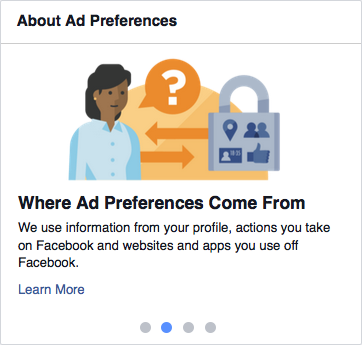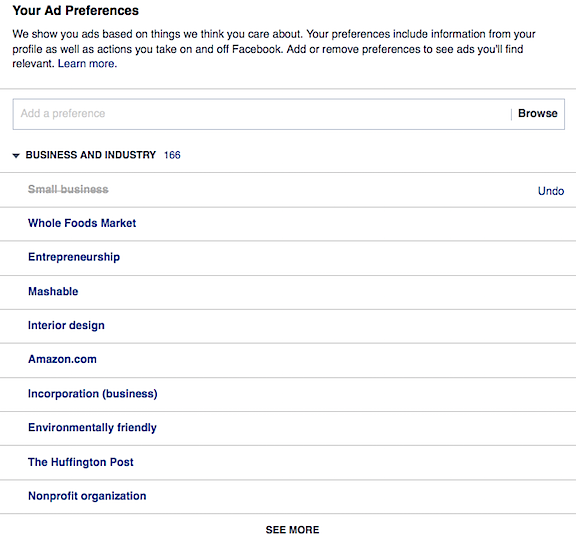My reaction to a Wells Fargo ad that has my creative friends outraged.
One of my creative friends on Facebook posted the following ad image:

His comment: “Oh, Wells Fargo, fuck off.”
His friends had similar comments voicing similar outrage.
Now if you were born and raised on the east coast — as I was — you might not understand the problem. I think east coasters are raised with a different set of values than the rest of the country. I suspect the person who created the ad and the one who approved it didn’t get it because if they did, it never would have appeared. While it plays to a certain group of people, it’s downright offensive to others.
I get both sides and want to explore them briefly here.
Career-Focused Parents
The ad creators were likely tapping into the hopes and dreams of parents who simply want their kids to achieve on a career path that they can be proud of. Back east, at least in the household I grew up in, that meant having a job title that could be equated with a good living. In other words, money.
I get this, possibly a lot more than women in my age group do. When I was in high school and was good in math and showed an interest in accounting, it was a given that I’d go to college and eventually be a CPA. My (lower) middle class family was all over that idea. They saw a CPA as someone who makes a lot of money. There was even talk of me eventually becoming an actuary — the folks with accounting degrees who made even more money.
For the record, none of that talk came from me. I didn’t want to be an actuary and, as my college time progressed, I didn’t want to be a CPA, either. I admitted to myself, in my junior year, that what I really wanted to be was a writer. (I’d been writing since I was 13 and still have those notebooks.) That’s when I got up the nerve to phone home and tell my mother I wanted to change my major to journalism. I’m sure seismologists are still talking about the minor quake caused by the fit she threw at me over the phone that day. Writers don’t make money, she told me. Do you want to be poor for the rest of your life?
Of course I didn’t — I’d had a good taste of that life when my father left us and we were trying to survive on my mother’s waitressing pay. So I stuck with accounting. Two years later, was working at the first of three jobs in auditing that made my first eight years out of college the nine-to-five grind I grew to despise.
I should point out that a lot of women my age were never pushed into careers the way I was. Although the ones with financial resources did go to college, it was understood that they were there for an “MRS degree.” (That was the big joke around campus.) So many of the ones I knew in the very expensive private university I went to — Hofstra on Long Island, if you must know; I got scholarships — hooked up with a male counterpart on a solid career track, got married, and put their BA or BBA or BS degree aside, never to be used. It was a given in the 70s and 80s that women got married, had children, and let their husbands take care of the finances. But my family never pushed me that way and when I was old enough to think for myself, I knew it wasn’t for me.
Neither was being a CPA.
My mother freaked out again when I left the last of those three jobs — where I was a financial analyst for a Fortune 100 company making more money at age 28 than my father ever made — to start a freelance writing career. But within a few years, I was making a good living and a few years after that, I was making an incredible (even to me) living. Doing what I wanted to do, building my own unique career path, making my own life outside corporate America.
But you see, the parents the Wells Fargo ad are appealing to don’t care what their kids want to do with their lives. Like my mother, they just want their kids to have potentially lucrative careers that they can brag to their friends about. After all, which sounds better:
- Maria’s article about the new zika virus prevention measures being tested in Florida was just published in the New York Times.
- Maria was just promoted to Director of Auditing at Wells Fargo Bank.
What I don’t think my mother counted on was my ability to succeed as a writer. I suspect “Maria just published her fiftieth book” satisfied her need to brag. And I don’t think “Maria just bought a helicopter” hurt either. Touché.
From the Creatives’ Point of View
To be fair, this Wells Fargo ad seems to take a slightly different tack. They’re pushing careers in science. It’s as if they’re saying to parents, “Sure, your kid might want to be a ballerina or actor now, but we can help you get him or her on the right track to a great career in the sciences.” It doesn’t take much to walk away with the message that a career in the sciences is much better than a career in the arts.
And that’s what’s offending my creative friends.
What’s wrong with wanting to be a ballerina or an actor? Or a writer? Or an artist?
In my opinion, if a kid has a real natural talent for dancing or acting or writing or painting or any other creative thing and loves to do it, he or she should be encouraged at every step. Nurture that love. Provide lessons and moral support. Help him or her succeed in doing something he or she loves.
Sure, a lot of kids will “grow out of” their love for a creative endeavor. But what about the kids who don’t?
Kids like me? I began writing stories when I was 13 and did it until I was deep into my 40s. Writing is in my blood, as it is with most writers. Blogging is an outshoot of this, a creative outlet for me — even though the stories I tell here are deeply rooted in fact and/or opinion. I never grew out of my love for writing. I was just smart enough to jump the tracks when I realized my career train was taking me in a direction I didn’t want to go. How many other people aren’t brave enough to do this? And get stuck with a career and possibly a life that they really don’t like?
Why would you pull a kid away from something he or she loved doing — and might actually be good at — and push him or her into a career they might not like? A career that would leave him or her feeling unfulfilled? Always wondering what life had been like if they’d stuck with the thing they really loved?
Imagine if the world’s great creatives had been pushed into “practical” careers and stayed there: Fred Astaire, Martha Graham, Tom Hanks, Meryl Streep, Pablo Picasso, Claude Monet, Ernest Hemingway, Mark Twain, Kurt Vonnegut? And countless others? Can you imagine how dull and empty our world would be without the creatives that make us think and wonder? Who entertain and enlighten us?
Are any of these people worth less than an engineer or botanist?
Success Trumps Happiness?
To me, the Wells Fargo ad represents a sad truth about today’s American society: It’s more important to be successful than to be happy. And sadly, success is measured by what you do, what you earn, and what you own.
Parents should want just two career-related things for their children’s futures:
- The importance (to me) of financial security
Because of my past, financial security is very important to me. I don’t want to be poor, I don’t want to move back to my mother’s home — even if it were possible. And I take great pride — which fuels my happiness — in my ability to make a decent living in my current career as a pilot. My financial security also helped me in my costly divorce battle, making it very easy to rebuild my life alone.
I’m also very happy with the life I’ve made for myself, especially these past few years. I’m happy with my work and the amount of time I have to travel and play and spend with friends.
None of this was handed to me; I worked hard to get where I am. The feeling of achievement I get almost every day also adds to my overall feelings of happiness and well-being, as I blogged in July.
My parents should be satisfied, even though I never became the CPA they wanted me to become.
Financial security. Can they support themselves, especially as they get older? No parent who cares about a child really wants that child living at home because they can’t support themselves. But under no circumstances should a child be pushed into a career because its earning potential is greater than the career that child wants.
- Happiness. The way I see it, if you can wake up every morning — or nearly every morning — looking forward to that day, you’re happy. (I’m there now, but I certainly wasn’t there when the alarm went off at 7 AM and had to make a 30-mile commute to a job I hated. The memory of those mornings has scarred me for life.)
Note that is a bulleted list, not a numbered list. That means you can take those two points in any order. I guess the order you take them in determines, in part, the kind of parent you are.
Now where’s the Wells Fargo ad promoting careers as dancers or actors? You know, you can send a kid to a costly school for that, too.





